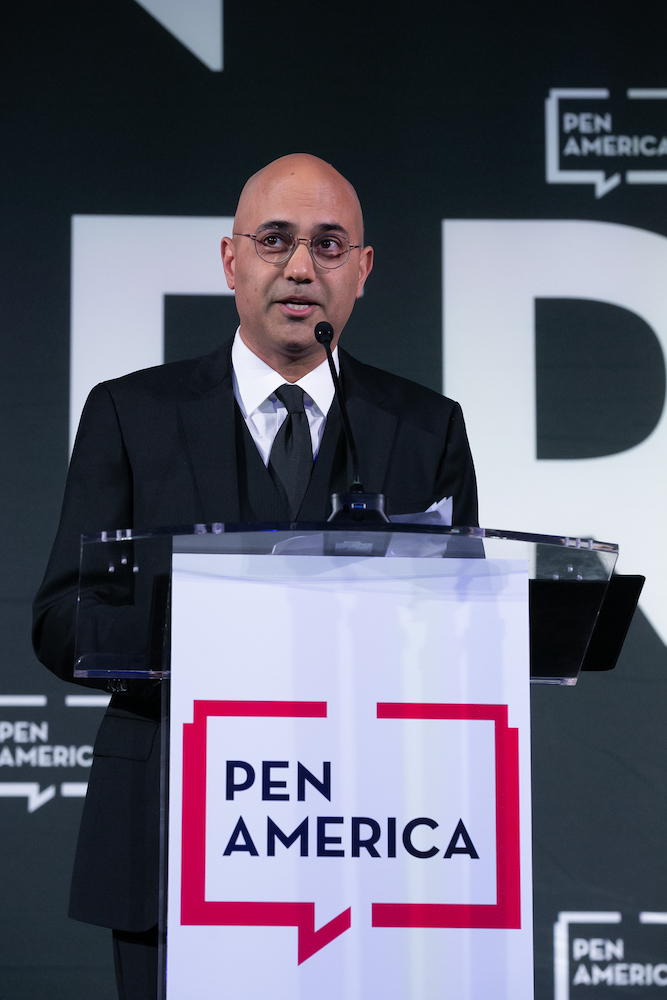Ayad Akhtar’s Remarks at the 2022 PEN America Literary Gala

Ayad Akhtar, president of PEN America. Photo by Beowulf Sheehan and Jeska Sand for PEN America
I’m Ayad Akhtar, President of PEN America. On behalf of PEN, I want to officially welcome you all to our yearly gala celebration. It’s still a particular thrill to be together in person, and I am very excited about the extraordinary honorees and speakers tonight. Thank you for being here with us. And thank you for supporting PEN.
Tonight, on the occasion of this celebration of our organization and its mission to protect freedom of expression, I’d like to share a few thoughts about democracy and power.
Democracy can mean many things to many people, a word that has often been a catch-all for a way of being that we, here, in this country, mostly took for granted. A word carrying some valence of justice we intuited without fully grasping. Greek historian Thucydides hints at the connection, when he writes that in human affairs, the question of justice is only relevant where there is equal power to enforce it, for without equal power, the strong will do what they can and the weak will suffer what they must.
Simply put, in a democracy, the will of the strong is not simply borne by the weak. There is, at the very least, a notion — however nominal, however incomplete — of a process, a path, to more equal power. A process that does not in theory entail violence, but rather speech. Speaking to each other publicly about our needs, our grievances, our national identities, our critiques of the status quo, and also about the values we believe are worth conserving. Speaking to one other, more or less freely, about everything that pertains to our collective life, this is democracy. And it stands in opposition to an embrace of naked power as a means of politics.
Naked power and it’s celebration is the logic of the bully, and that the rise of autocracy across the planet would coincide with the rise of, and jubilation in, the public display of bullying — as we see everyday in our school board meetings and on our Twitter accounts — this is not just a coincidence. These things are all connected.
Indeed, naked, unequal power, as Thucydides called it, in the business sector we call market share — and we celebrate and idolize the destructive success of our wealthiest victors. Indeed, we are grateful for, even dependent on, their abusive practices. That’s how we end up at behemoths like Walmart or Amazon, ensnared by the lowest price.
But it isn’t just small businesses that are bullied. The interests of those at the margins, of course, have been bullied by those at the center since the founding. And those in the rural heartlands live bullied by the corporate interests of their fellow, far-wealthier citizens on the coasts. And of course, strongmen in power bullying their own nations and those along their borders, as in Ukraine today, is perhaps the most disturbing instance of naked power today, which appears to be only in ascendence everywhere.
What to do?
For some of us, bullying the bully back with whatever means we can muster feels like the appropriate response. It feel like redress, finally. It can feel like justice.
But it isn’t justice. It’s just a different kind of embrace of unclad, undisguised power. It’s not the spirit of exchange, of debate, of critique and commentary, the exchange of speech that is at the heart of all advance — advance in scientific and human knowledge, in political equality — advance made possible by the willingness to inquire, to think freely, and to speak. Even if and when the freedom to do so is threatened.
For that is the truth. The exercise of speech that matters to us most, that must matter to us most, that speech which articulates our needs, our understanding, our competing senses of reality itself, this speech which shapes our lives in co-operation with one another, however tensely, this is what democracy is built on. This is what democracy means.
One more thing: Yes, speaking is at the root of it all, but we cannot only be speakers. We must be those listening, as well. Protecting freedom of expression is not enough; we must be as committed to recognizing and encouraging the act of hearing one another; for without that, speech has no purchase, and can have little enduring meaning.
Thank you. Let the festivities begin.






